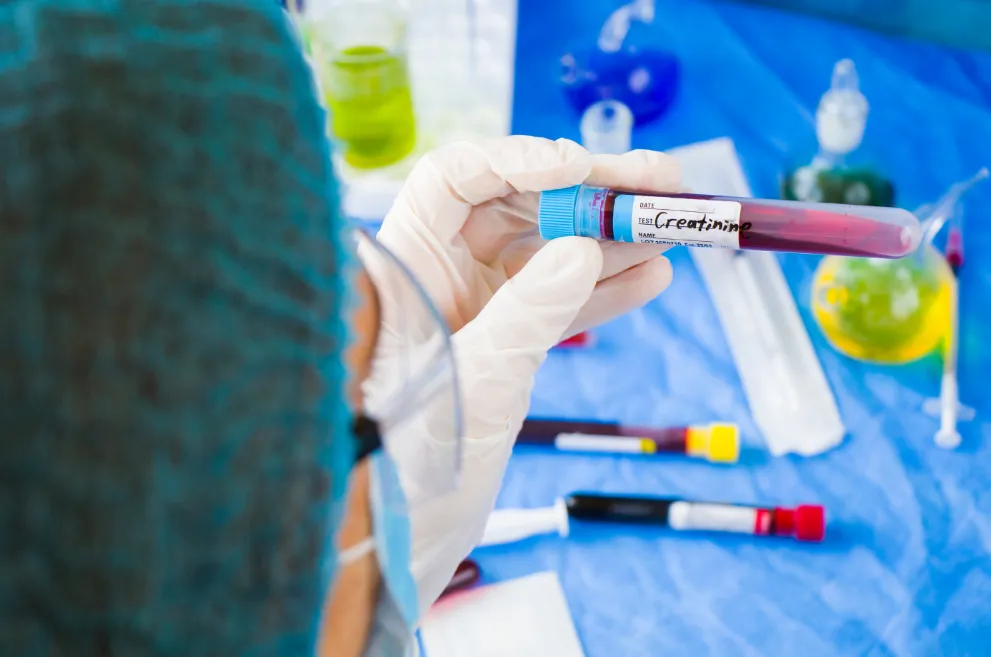Creatinine is a waste product that is produced in the muscles when they contract. It is filtered out of the blood by the kidneys and eliminated from the body through urine. Creatinine levels in the blood can provide valuable information about the functioning of the kidneys. In this blog post, we will discuss creatinine blood tests, what normal levels are, and what abnormal levels could indicate.
What is a creatinine blood test?
A creatinine blood test measures the level of creatinine in the blood. This test is often used to evaluate kidney function. When the kidneys are functioning properly, they filter creatinine out of the blood and eliminate it through urine. However, when the kidneys are not functioning properly, creatinine levels can rise in the blood.
Why is a creatinine blood test performed?
A creatinine blood test may be performed for a variety of reasons, including:
To evaluate kidney function: Creatinine levels in the blood can provide information about how well the kidneys are functioning.
To monitor kidney disease: Creatinine levels may be monitored over time to track the progression of kidney disease.
To monitor medication side effects: Some medications can affect kidney function and increase creatinine levels in the blood.
What are normal creatinine levels?
The normal range for creatinine levels in the blood can vary slightly depending on the laboratory that performs the test. In general, normal creatinine levels are:
- For adult men: 0.6 to 1.2 milligrams per deciliter (mg/dL)
- For adult women: 0.5 to 1.1 mg/dL
- For children: 0.3 to 0.7 mg/dL
What do abnormal creatinine levels indicate?
Abnormal creatinine levels may indicate that the kidneys are not functioning properly. High levels of creatinine in the blood can be a sign of kidney disease, kidney damage, or a blockage in the urinary tract. Low levels of creatinine in the blood may be a sign of decreased muscle mass or malnutrition.
If your creatinine levels are abnormal, your healthcare provider may recommend further testing to determine the underlying cause. This may include additional blood tests, urine tests, imaging tests, or a kidney biopsy. An elevated creatinine level doesn't necessarily imply impairment in kidney function. Some other factors that can increase your creatinine level include increased exercise, protein consumption, dehydration, certain medications, and pregnancy.
Can medications affect my creatinine level?
Medications, whether prescription, over the counter, or herbal supplements, may alter your creatinine level. You should tell your healthcare provider if you are taking any medications before doing a creatinine test. Examples of medications that can affect creatinine levels include: Bactrim, Keflex (cephalexin), Ceftin (cefuroxime), Ceclor (cefaclor), Tagamet (cimetidine), Aleve (naproxen), Advil (ibuprofen), and Tricor (fenofibrate)
How do I lower my creatinine level?
Changes in lifestyle and diet can help you keep your blood creatinine level low. These include staying hydrated, reducing protein intake, reducing vigorous activity, and eating more fiber. You should also avoid creatinine supplements, high-sodium processed food, smoking, excessive alcohol consumption, and overuse of NSAIDs.
Are there medications to keep my creatinine level low?
No medications are specifically used to reduce the amount of creatinine in your blood. However, your healthcare provider may prescribe you some of the medications below if your condition is caused by underlying kidney disease.
- Angiotensin-converting enzyme inhibitors (ACEIs): examples include Zestril (lisinopril), Lotensin (benazepril), and Capoten (captopril)
- Angiotensin II receptor blockers (ARBs): examples include Cozaar (losartan) and Avapro (irbesartan).
- Erythropoiesis-stimulating agents (ESAs): examples include Procrit (epoetin alfa) and Aranesp (darbepoetin alfa). It is used to treat anemia caused by kidney disease.
- Phosphate or potassium binders: examples of phosphate binders include Renvela (sevelamer carbonate) and Fosrenol (lanthanum carbonate), while potassium binders include sodium polystyrene sulfonate and calcium polystyrene sulfonate. They help people with kidney disease to eliminate extra phosphate or potassium.
You can save on your medications at more than 70,000 pharmacies nationwide, including CVS, Rite Aid, and Walgreens, using an RxLess prescription discount card.
















